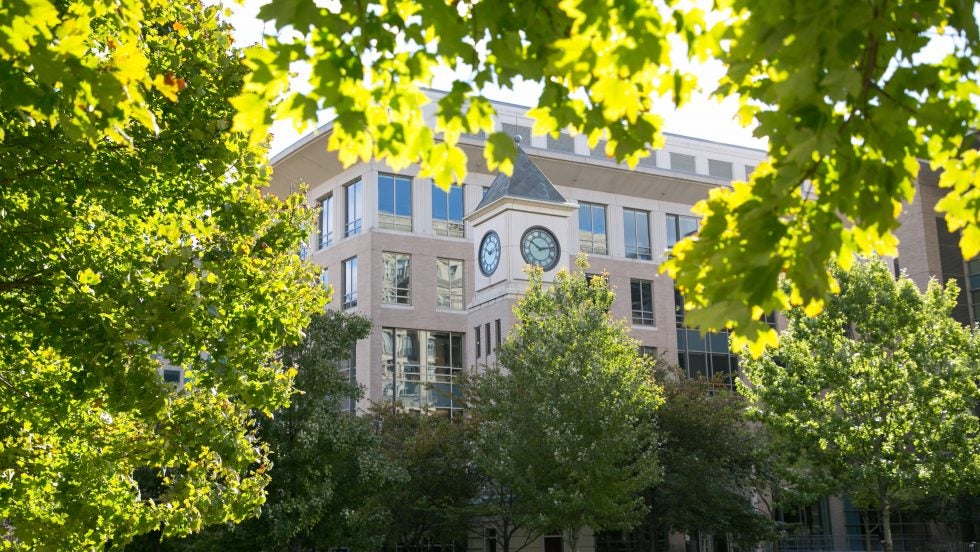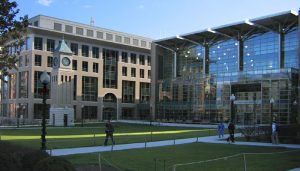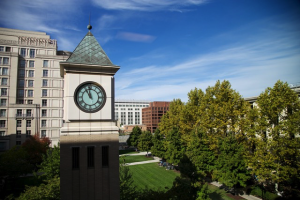Amid an intensification of immigration enforcement under the second Trump administration, lawyers are calling for people to stay in the fight to protect immigrant access to legal representation.
Many current and former members of the Georgetown University Law Center (GULC) community, however, fear that the rapidly changing professional landscape will push people away from the field of immigration law.
“I can’t put my eggs in a basket that is actively falling apart,” Becca Jenkins (LAW ’25) said.
The Trump administration’s executive orders, stop-work orders, and funding cuts have threatened many immigration lawyers’ ability to remain in nonprofit immigration work. At the same time, these shifts have amplified the mental health challenges associated with such work. Those who immersed themselves in the high-intensity, often demoralizing world of immigration law while at GULC and decided to pursue work in immigration nonprofits have found that their determination has not waned as they face new professional hurdles during the second Trump administration.
This resolve, however, might not protect GULC alumni from other threats to their ability to keep doing this work.
On Jan. 22, two days after an executive order calling for the review and potential termination of programs serving “removable aliens,” the Department of Justice ordered federally funded immigration legal service providers to stop work on certain programs. These programs include legal orientations for detained adults and legal representation for children who entered the U.S. unaccompanied.
Many of these programs receive funding through a contract between the government and the Acacia Center for Justice, a nonprofit organization that partners with immigrant legal defenders throughout the country. The center had previously received funding from the Department of Health and Human Services, which Acacia distributed to the organizations that comprise its Legal Orientation Program (LOP) for detained adults and Unaccompanied Children Program (UCP).
While Acacia’s funding was briefly restored on Feb. 3, on Feb. 18, the Trump administration issued another stop-work order, this time only related to unaccompanied children’s programs. Three days later, the order was reversed and UCP funding was restored. However, in late March the administration informed the Acacia Center that it was again terminating much of the organization’s legal work, including programs providing representation to approximately 26,000 children in immigration court.
The series of changes has disrupted these nonprofits’ functioning, including by forcing the layoff of staff and leaving migrant children unrepresented in court.
“We don’t want to have kids going to court unrepresented,” Lisa Ledvora (LAW ’22) said. “Kids as young as five months old are in immigration court. They obviously can’t be expected to advocate for themselves in front of a judge or understand their situation at all.”
After the March stop-work order, Ledvora—whose work with unaccompanied immigrant children is federally funded through the Acacia grant—thought she would be out of a job by the end of April. The week after the order, she and the other approximately 60 members of her legal team at The Door, a New York youth development organization, received 30-day notices of layoffs.
The notices have since been rescinded, as the organization resorted to financial reserves to continue paying staff temporarily. The staff was assured that they will have jobs until the end of June, but that layoffs might occur subsequently if The Door does not regain access to Acacia grant money. Even though a California federal judge ordered the administration to restore funding for unaccompanied children on April 1, legal aid groups reported that the UCP funding remained frozen three weeks later. On April 29, a judge halted the termination of funding for unaccompanied children’s programs via a preliminary injunction and temporarily reinstated Acacia’s UCP funding through the end of the fiscal year in September. However, some organizations had already laid off staff. Furthermore, funding for the Legal Orientation Program remains suspended.
Amid rapid shifts, Ledvora has focused on what she considers her ethical and moral obligations to her clients, including continuing to show up and do the work even as that work changes by the hour.
“What should we tell [our clients] in terms of, we may or may not be able to represent you in the future?” Ledvora said. “And that’s the most stressful thing right now, is figuring out how to talk to clients about the moment and fulfill our responsibilities as representatives.”
Elizabeth Yoder (LAW ’24) endured similar professional tumult as the intermittent stop-work orders played out at RAICES, a Texas-based immigration nonprofit. For weeks, staff members had been asking if there would be layoffs, until one day leadership suddenly announced that they had to let people go.
For two hours, staff waited as they received batch after batch of layoff emails. RAICES had lost just over half of its funding, and, as a result, cut back on approximately seventy percent of its salaries—Yoder was not included in the layoffs. On April 9, it was announced that their funding had been restored, but Yoder thinks that some of her coworkers had already begun to leave for the relative stability of private practice.
On March 7, the Trump administration published an executive order accusing “activist” organizations of criminal activity, such as aiding unauthorized immigration. With this executive order and other attacks on immigration law, the Trump administration has escalated accusations of misconduct within the field.
RAICES—which provides legal support to immigrants of a variety of legal statuses, including deportees—has already faced several challenges to its work following a Jan. 20 executive order directing government agencies to terminate and claw back funding provided to nonprofits serving “removable or illegal aliens,” raising the concern that these organizations might promote or facilitate violations of immigration law.
“What we’re doing is not illegal, but it is the work that he’s targeting,” Yoder said.
In addition to temporary losses of federal funding, immigration nonprofits have also lost some of the pro bono support available to them, as major law firms allegedly have begun to turn down lawsuits challenging the administration’s immigration policies to avoid being targeted themselves.
The population of removable immigrants referred to in the Jan. 20 executive order might soon skyrocket as a result of recent actions by the administration. Efforts to terminate a variety of legal statuses—including temporary protected statuses for Afghans and parole processes for Cubans, Haitians, Nicaraguans, and Venezuelans—could expand the population of undocumented people in the U.S.
Immigration lawyers are facing increasingly prevalent accusations of illegal activity, such as encouraging their clients to exaggerate or lie about their persecution. Ledvora refutes these accusations, explaining instead that her work revolves around helping her clients organize and present their lived experiences in a way that demonstrates the danger of returning to their countries of origin.
“Regular people don’t know asylum law, don’t know immigration law, and don’t know what the judge is looking for,” Ledvora said. “They need assistance in taking the facts out of their story and presenting them in a way that makes their case credible.”
Immigration lawyers recognize that malpractice does occur, but rarely. Matthew Boaz (LAW ’15), an immigration law professor at the University of Kentucky, believes that a small number of ill-intentioned actors should not reflect negatively on the majority of those in the field.
“No system’s without fraud,” Boaz said. “Our tax system has billions of dollars of fraud every year, and yet we don’t say, ‘Let’s get rid of the tax system,’ or ‘Everybody who pays taxes is a fraud.’”
The March 7 executive order also indicated that the administration could begin officially excluding the staff of certain immigration law firms from the Public Service Loan Forgiveness program (PSLF). Through PSLF, attorneys who work for a government organization or a qualifying nonprofit organization for 10 years while keeping up with their monthly payments can have their remaining student loans forgiven. The program removes barriers to these positions for those who otherwise might have to pursue higher-paying jobs to pay off student loans.
Threats to loan forgiveness programs could force those who rely on them into more lucrative positions to pay off their student debts. Elizabeth Gibson (LAW ’14), a managing attorney at the National Immigrant Justice Center, another Acacia contract organization facing funding loss, says that an end to PSLF eligibility could decrease the availability of immigration lawyers.
“They are basically making it impossible to be a lawyer who advocates for immigrants, so that there is no one to advocate for immigrants,” Gibson said.
Beyond the logistical hurdles that the Trump administration has created for immigration lawyers, the emotional impact of working with people who face rising threats to their ability to remain in the country creates additional barriers to remaining in the field.
Ledvora has experienced heightened mental health challenges throughout the start of the new administration. She began taking antidepressants in law school, but has felt an even greater emotional impact from her close work with often-traumatized populations in recent months. Beyond stress about job insecurity and potential loss of income, Ledvora has grappled with orders to stop providing representation to unaccompanied children.
“Those were mentally very challenging days,” Ledvora said.
One current law student, who preferred to remain anonymous to keep their mental health struggles private, expressed that they feared that the emotional toll of continuing to work in the field would lead to them experiencing a mental health crisis. In a time of mass deportation agendas and narrowing legal pathways, attorneys are often the ones left to communicate upsetting information to their clients.
“I feared that my job would become forty hours a week of telling people they had no hope and were going to get deported,” the student said.
Alex Ciullo (LAW ’24) has also struggled to respond to her clients’ fears of recent increases in immigration enforcement. Ciullo works for Murray Osorio, one of the firms that provides counsel to Kilmar Abrego Garcia, a Maryland man deported to El Salvador in what ICE later admitted to be an administrative mistake.
She is currently representing an undocumented woman who fears being separated from her children and husband, who are U.S. citizens. The client recently expressed concern that Immigration and Customs Enforcement (ICE) would pick her up following her hearing, regardless of whether she won or lost. While a year ago, Ciullo would have reassured her immediately, she has recently seen ICE agents detaining immigrants before their orders of removal have been finalized and they still have the right to appeal.
“Having to tell her, ‘Okay, 99% sure you’re going to be fine, but there is a 1% chance that there could be some scary men waiting outside the door to take you away from your U.S. citizen family that you’ve had here for twenty years,’” Ciullo said. “Yeah, it definitely sucks that I can’t give people more hope or more confidence.”
Many law students leave Georgetown excited to work to ensure that vulnerable immigrant communities have someone fighting for them in court. However, the toll of watching access to legal representation crumble has been immense, and Yoder says that the importance of self-care only continues to grow.
“Finding a way to do that work sustainably is so important,” Yoder said. “Otherwise, you’re not going to be able to maintain a career in this field.”
Austin Rose (CAS’18, LAW ’21), who works as a managing attorney at the Amica Center, a nonprofit providing legal support to detained immigrants, believes that maintaining a career in the field and being steadfast is essential at this moment.
“Otherwise, we’re just kind of bowing to this regime that is really violating people’s human rights and sending us into what I view as fascism,” Rose said.
Note: Katherine Hawes began a job at the Amica Center after this piece was reported
The combination of the stop-work orders, cuts to funding, job insecurity, and the emotional toll of bearing witness to the widespread loss of legal statuses has led many to worry that the Trump administration’s immigration policies will scare away those thinking of entering the field.
Becca Jenkins spent most of her time at Georgetown Law preparing for a legal career in immigration. Now ending her final year of law school, she has made the difficult decision to shift temporarily toward public defense. Following Trump’s 2024 win, Jenkins worried that immigration jobs would start disappearing and that the work would become too emotionally taxing.
“It’s honestly pretty painful having gone to school for this thing and spending three years working toward this thing, and then being faced with the reality that I don’t think that I am equipped to do this right now,” Jenkins said.
Jenkins recognizes that she will be of no use to people if she burns out immediately after law school. As such, she decided to think more creatively about how to pursue her passion for supporting immigrant communities while also protecting her ability to work in public service for a long time. Knowing that her career in public defense will still allow her to work with noncitizens has reassured Jenkins that she will not be walking away from the field entirely, and she hopes to focus on immigration again down the line.
“I think right now the main thing that is keeping me from committing is the uncertainty and the anxiety that comes with the uncertainty,” Jenkins said.
Her decision to shift paths for the moment was validated by a spring break trip with Georgetown Law’s Human Rights Institute to Tijuana, Mexico, and San Diego, California. The first of these trips occurred in the 2018-19 school year, after the first Trump Administration had initiated its policy of deliberate family separation. Students previously helped detainees in the South Texas Family Residential Center in Dilley, Texas, prepare for their credible fear interviews (CFIs).
Last academic year, these trips shifted further west: students now work with immigration legal aid organization Al Otro Lado in a detention center in Calexico, California, and in migrant shelters in Tijuana. Many of the immigrants they worked with were impacted by the Trump administration’s sudden cancellation of all appointments scheduled through the U.S. Customs & Border Protection’s CBP One application. These appointments could have allowed migrants to cross the border and seek asylum in the U.S.
“This year, the trip was more or less telling people, ‘We don’t know when the border’s going to open again,’” Jenkins said. “‘You know, you had a CBP One app appointment for January 21, but that doesn’t unfortunately mean anything anymore.’”
Jenkins barely mentally managed to do that work for a week during her spring trip. Under current conditions, she fears she could not continue in that work for years. According to Jenkins, many people on the trip were more emotionally impacted by the experience than they had expected.
Michael Lamanna (LAW ’25), who participated in the trip in his first year at GULC, has helped organize and lead the trips for the past two years. To Lamanna, the most recent trip was less intense than they have been in the past, as recent efforts to close the border have resulted in smaller migration flows and a lower strain on available social and legal services. However, both Lamanna and the program’s faculty leader, Andrew Schoenholtz, reported increased uncertainty surrounding the trip this past spring, as the onslaught of challenges to immigration nonprofits’ funding meant that organizers had not known in advance to what extent they would be able to work alongside Al Otro Lado, another organization funded by the Acacia contract.
According to Schoenholtz, though, uncertainty in this field is nothing new.
“We’ll deal with it,” Schoenholtz said. “That’s what advocates learn to do.”
These trips to the border give students a window into the many specific challenges of working within immigration detention centers. Some walk away having discovered that turning this type of work into a career would be unsustainable for them. For Emily Mitrione (LAW ’25), participating in this trip during her first year of law school did not deter her from working in the immigration field, but it made her realize that she did not want to work within detention facilities.
“Going into a facility every day, there’s no windows, there’s no light,” Mitrione said. “Even if you prep somebody for their CFI, there’s no guarantee that then they’re going to pass.”
Despite the challenges of the trip, Schoenholtz said that the majority of student participants end up returning to this work. Upon their return, some of the students on this year’s spring break trip applied for the law school’s intensive asylum clinic, the Center for Applied Legal Studies (CALS).
While law schools typically offer some form of hands-on learning for their students, the opportunity to participate in intensive clinics is rarer. Since CALS comprises 12 credits, compared to less time-intensive practicums offered by other universities, students have the opportunity to see a case from beginning to end. They are supervised by faculty advisors, but students handle all of the information gathering, affidavit drafting, finding of corroborative evidence, and preparation of documents for submission to court.
Similarly to the spring break trips, Schoenholtz said that the clinic strengthens most students’ desire to incorporate immigration-related work in their careers, even if it does not become their primary focus. Many alumni who end up in law firms have the desire to do pro bono work, and their experience with CALS influences them to continue asylum work in that capacity.
The GULC students who participate in the CALS clinics and the HRI border trips and then decide they are ready to pursue immigration work full-time often possess a deeper understanding of the emotional strain that the work might place on them. However, some lawyers are feeling new levels of despair as the Trump administration challenges their ability to continue supporting their vulnerable clients.
In recent months, organizations like RAICES have had to close out many cases that lawyers cannot continue to work on due to the repeated threats to their funding. In what she feels to be a despairing time at her organization, Yoder is struggling to find hope within her work.
“The little wins are not closing out cases,” Yoder said. “That’s the only thing we really can focus on.”
For many immigration lawyers, holding on to these little wins has helped get them through the tumultuous early months of the new administration. However, as these successes become increasingly sparse, some lawyers turn to other sources of motivation.
Rose believes that as this administration continues, he might have stretches of several months without any small wins. He anticipates that appreciating the value in staying in the fight, rather than any success he might have along the way, will drive him forward regardless of what this field looks like in the near future.
“I am often the only person in the world in this person’s corner, and that’s important in and of itself,” Rose said.






